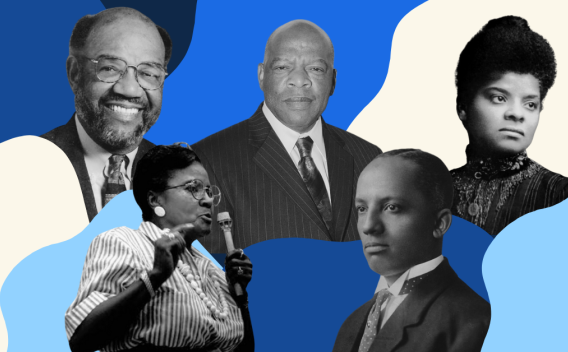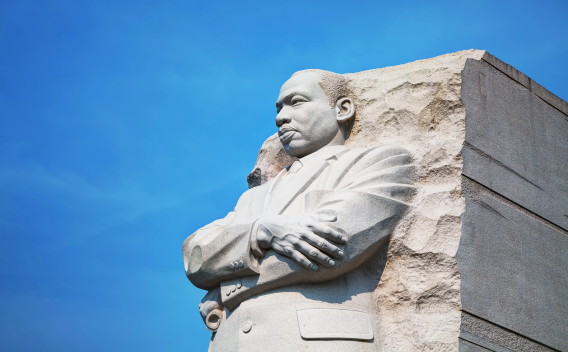By
Published
February 12, 2021
Tags
In 2014, Michelle Molitor founded The Equity Lab as a means to help organizations begin productive conversations and develop comprehensive plans to advance racial equity, diversity and inclusion (REDI) in their work.
Seven years later–coming off the heels of a Capitol insurrection, a divisive election, months of mass protests calling for racial justice, and a pandemic disproportionately impacting Black Americans and communities of color–the need for organizations to actively disrupt racial and ethnic inequity has never felt more urgent. To help organizations be part of this change, not just in words but in learning and in action, The Equity Lab works with its partners to build REDI journeys designed to advance racial equity within their organizations authentically, effectively and sustainably.
The Equity Lab has worked with Charles and Lynn Schusterman Family Philanthropies to guide our own REDI journey. While our commitment to equity extends to all facets of diversity, our intention for this journey is to increase REDI awareness within our organization and, ultimately, lead to more impactful partnerships with the communities we support and more effective efforts to advance racial, gender and economic equity through our grantmaking. Our work with The Equity Lab began a staff-wide trip to Alabama for our team to better understand America’s history of anti-Black racism. We are now continuing with an 18-month REDI learning process.
Below, you can hear directly from Michelle about the Equity Lab’s unique theory of change, key steps any organization should take to advance racial equity, perspective on how we can authentically honor Black History Month and thoughts on the how the current historical moment could impact the future of racial justice in the United States.
Michelle, you have been working with Schusterman on our own racial equity journey for nearly two years now, and you have many more years of experience working with organizations on centering racial equity in their work. What was your journey to founding The Equity Lab?
So, first and foremost, I am a trained educator. After years of classroom teaching, I helped found and open the E.L. Haynes Public Charter School in Washington D.C., where I wanted to figure out a productive way for our school to engage in meaningful conversations about race across difference in meaningful ways.
I started facilitating conversations about equity with our teachers and staff to think through questions like, “what does it mean to engage young students in conversations about racial disparities?” Eventually, other school leaders heard about our work and reached out about joining our sessions. There was clearly an appetite for discussions on racial inequity in education and a recognition that this problem persisted beyond our school or the D.C. school system, but across the country.
At this point, I decided to focus all of my energy into leading these conversations, so I left my school and founded the Fellowship for Race and Equity in Education. Over time, we decided to expand our focus beyond the education system, and we transitioned to The Equity Lab.
Although your personal background is in education, why is it important for you that The Equity Lab works with organizations in all sectors?
The challenge of achieving racial equity isn’t limited to just the education system; systems of inequity are rooted in all American institutions. And all of these institutions exist interdependently. For us to be as effective as possible, we need to foster cross-sector conversations about racial equity rather than having these conversations in our own silos.
The Equity Lab partners with organizations by implementing a three-phase equity journey. What are these phases?
The first phase is “Evaluation & Setting a Common Language”. This is when we work with an organization on setting intentions and getting all staff on the same page for REDI journey. Importantly, this is when we help our partners get organized for the rest of the journey, which can include tactics like setting up an equity audit of internal and external systems, launching a listening tour to get a variety of different perspectives on the organization’s equity standing, or establishing a team dedicated to REDI work.
The second phase of the journey is “Personal Development & Organizational Change”. This is when our partners lean into the data surfaced in phase one and unpack where inequity lives at their organization. Together, we develop working plans for specific teams to center equity in how they operate and actually begin to implement the intentions laid out in the first phase.
Finally, phase three is called “Owning Your Leadership in the Field”. This is when our partners are really in the driver’s seat leading their racial equity journey, while developing a clear approach to centering racial equity in their external facing work and public leadership. This phase is meant to serve as a key transition point to lead and execute their REDI work in perpetuity.
No matter what organization we support, our work together needs to be a long-term partnership. The process of authentically centering racial equity at an organization is a long-game. For context, it often takes five to ten years for organizations to not only ensure they are functioning equitably, but are recognized as equitable organizations externally.
For an organization looking to authentically center REDI in their work, what is most important for getting a REDI journey off the ground?
Above all, I think an organization’s leadership needs to be on board with having a REDI journey. In my experience, when a call for a REDI journey comes from staff only and doesn’t have leadership buy-in, the work reaches a barrier because there isn’t alignment from the top.
I also think that getting approval for the necessary resources is a critical step to starting to center REDI at an organization. I don’t just mean financial resources, but capacity. Many organizations typically ask staff members to lead racial equity work on top of their full-time jobs, and, more often than not, it is people of color who bear the load of the work. Black women in particular are asked to shoulder much of this extra labor.
Finally, REDI work needs to be seen as an extensive, complex process. I think people tend to want simple answers to the problems that have existed in the United States for hundreds of years–and there are just not simple answers. This is an opportunity to learn and to grow together. We can do this in community, we can do this in relationship, and we can do this with a lot of love and grace for what it takes to really grow as organizations and as a society.
We are speaking together during Black History Month, which mainstream organizations have increasingly embraced over the years. Many critics, however, refer to these efforts as performative rather than supportive of the Black community. How can organizations, particularly organizations that are not Black-led, acknowledge Black History Month in ways that are meaningful and effective?
Public efforts during Black History Month can feel performative–if that’s the extent of an organization’s support for Black communities. Silence eleven months of the year speaks volumes more than saying something just one month of the year.
The real question that organizations need to be asking isn’t just, “how do we celebrate Black History Month?” but, “how do we support Black people all year?” Organizations should be celebrating Black History Month and actively showing up for Black communities year-round.
What is giving you hope right now?
A lot gives me hope! To be honest, I always have hope in this work. If I didn’t have hope, I wouldn’t be doing this work because it’s too hard if you’re not hopeful. Right now, I am especially optimistic because I am seeing more and more people realizing how interconnected we all are and the pressing need for actively advancing racial equity.
Many events over the past year contribute to this reckoning. For instance, the murders of George Floyd, Breonna Taylor, Ahmaud Arbery and, of course, the list of names goes on. It’s not that events like these are new–but combining them with additional moments like COVID-19 and the insurrection of the Capitol have made it painfully obvious that we have work to do as a country.
This is an opportunity for pushing the envelope–for real growth, for strategizing, for organizing. And it’s an opportunity for accountability, for holding ourselves and our institutions and systems accountable for the health and well-being for all of us. And that gives me great hope.
Interested in centering racial justice in your work? Learn more about The Equity Lab.
Plus, check out The Equity Lab’s list of resources on racial justice compiled for Schusterman Family Philanthropies.





